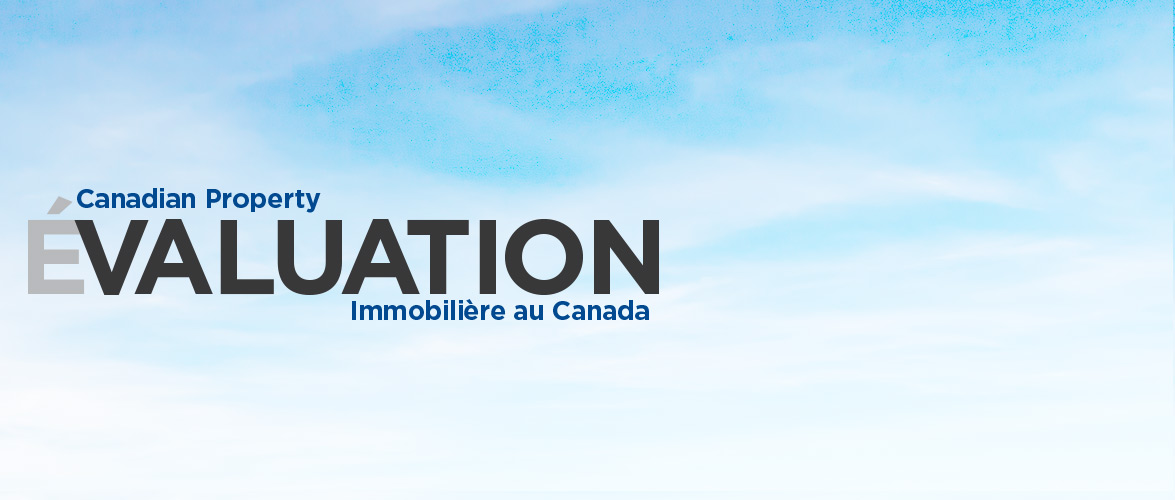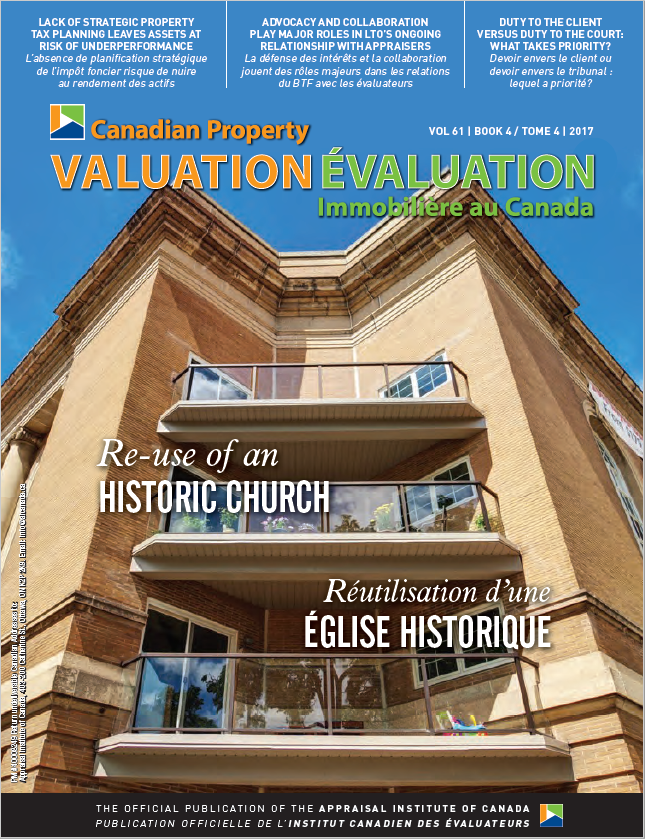Duty to the client versus duty to the court: What takes priority?
Canadian Property Valuation Magazine
Search the Library Online
Duty to the client versus duty to the court: What takes priority?
The fine line of lawyer involvement in the stages of drafting an expert report
By Antoine Hacault, Barrister & Solicitor
An AIC Member may be asked to prepare an expert report in anticipation of a dispute over real property, be it a marital dispute, a dispute between landlord and tenant, or a dispute with respect to the assessment or the expropriation of property. In this article, I intend to explore three general issues:
- What are your duties to the court if you testify as an expert witness?
- Does your duty to the court take priority over your duty to the client?
- What involvement, if any, is it appropriate for a lawyer to have with respect to the preparation of your report?
1. WHAT ARE YOUR DUTIES TO THE COURT IF YOU TESTIFY AS AN EXPERT WITNESS?
The Canadian Uniform Standards of Professional Appraisal Practice (CUSPAP) requires you to identify the client and the intended user[1] in your reports. How does this apply to reports that are intended for use before a tribunal?
I will start this discussion with the underlying principles related to expert evidence. You will be qualified as an expert in appraisal matters and, as such, certain principles and exceptions apply.
One of the leading cases is Moore v. Getahun, 2015 ONCA 55. The court held that expert evidence constitutes “an exception to the rule that witnesses may only testify as to facts, not opinions, and that it is the exclusive prerogative of the judge to draw inferences from proven facts”. The expert witness may provide facts as well as an opinion based upon the proven facts. This exception will apply to appraisers acting as expert witnesses. The expert appraiser witness has specialized knowledge and this knowledge can assist a decision maker in determining the implications of all of the data presented, where a decision maker may not have the knowledge or competence to draw the necessary inferences unaided by their expertise.
The question arises as to how we ensure that appraisers offer an unbiased expert opinion based on the proven facts to the courts. Various tribunals have instituted requirements with respect to expert witnesses testifying before their tribunals.
While the requirements vary from province to province, and some provinces do not even have requirements, an example of a declaration that you might have to sign as part of your retainer is as follows:
ACKNOWLEDGMENT OF EXPERT’S DUTY
- My name is ……………………………….. (name). I live at ………………………………… (city), in the …………………………………… (province) of ……………………………….(Country).
- I have been engaged by or on behalf of ………………… …… (name of party/parties) to provide evidence in relation to the above-noted court proceeding.
- I acknowledge that it is my duty to provide evidence in relation to this proceeding as follows:
- to provide opinion evidence that is fair, objective and non-partisan;
- to provide opinion evidence that is related only to matters that are within my area of expertise; and
- to provide such additional assistance as the court may reasonably require, to determine a matter in issue.
- I acknowledge that the duty referred to above prevails over any obligation that I may owe to any party by whom or on whose behalf I am engaged.
Date
Signature
(A copy of this form and more resources are available at https://www.aicanada.ca/professional-practice/expert-witness-resources/)
2. DOES YOUR DUTY TO THE COURT TAKE PRIORITY OVER YOUR DUTY TO THE CLIENT?
You will note that, although the wording acknowledges that you have been hired by one party to the dispute, it goes further to indicate that it is your duty to provide your opinion in a fair, objective and non-partisan way and, more importantly, to provide such assistance as the court may reasonably require, to determine a matter in issue.
Therefore, although the client is usually the person for whom you render professional services, the intended users in litigation are the client and the tribunal, with the added twist that the duty to the tribunal takes priority. You are expected to acknowledge that the duty to the tribunal prevails over any obligation that you, as an appraiser, owe to your client. This is the expectation of tribunals, irrespective of whether you have included the statement as part of your retainer. It is my recommendation that, if a tribunal does not require a statement similar to the one provided in this article, on your own accord, you should incorporate a similar statement as part of your retainer.
3. What involvement, if any, is it appropriate for a lawyer to have with respect to the preparation of your report?
In Moore v. Getahun, 2015 ONCA 55, the court reiterated the following Common Law principles that are considered to be general rules:
- Expert evidence presented to the court should be, and should be seen to be, the independent product of the expert uninfluenced as to form or content by the exigencies of litigation.
- An expert witness should provide independent assistance to the court by way of objective, unbiased opinion in relation to matters within his expertise [citation omitted]. An expert witness… should never assume the role of an advocate. (para.52)
In Ontario, there is a fairly extensive guide which sets out the role of a lawyer in relation to experts and their reports. It can be found at: http://www.advocates.ca/assets/files/pdf/The_Advocates_Society-Principles_Governing_Communications_with_Testifying_Experts_3_sep18.pdf
It is my view that the following guiding principles outlined in that guide reflect best practice.
A lawyer has a duty to present appraisal evidence that is:
- relevant to the matters at issue in the proceeding in question;
- reliable; and
- clear and comprehensible.
An appropriate degree of consultation with testifying appraisers is essential to fulfilling this duty in many cases. A lawyer may, therefore, consult with appraisers, and prepare appraisers to testify as expert witnesses during trials or hearings. A lawyer is not required to abandon the preparation of a report or affidavit entirely to an appraiser, and instead can provide appropriate advice regarding the format and content of a report or affidavit before it is finalized and delivered.
At the outset of any engagement with an appraiser, the appraiser should ensure that the lawyer provides complete information regarding his/her role and the nature and expectations of an expert’s duties, especially the requirements of independence and objectivity.
A lawyer should ensure that an appraiser has a clear understanding of the issue on which the appraiser has been asked to opine. A lawyer should also ensure that the appraiser is provided with all documentation and information relevant to the issue on which he or she has been asked to opine, regardless of whether that documentation or information is helpful or harmful to the client’s case.
In fulfilling the lawyer’s duty to present clear, comprehensible and relevant expert evidence, the lawyer should not communicate with an appraiser in any manner likely to interfere with the appraiser’s duties of independence and objectivity.
The appropriate degree of consultation between a lawyer and an appraiser who will testify as an expert will depend on the nature and complexity of the case in question, the level of experience of the appraiser, the nature of the appraiser’s expertise and other relevant circumstances of the case.
A lawyer should take reasonable steps to protect a testifying expert witness from unnecessary criticism.
While it is not the lawyer’s role to be a reviewer, a lawyer can be in a position, through his or her questions and comments, to enhance the quality of a member’s report, affidavit or review of another report presented as evidence in court. At a minimum, he or she can assist in avoiding inconsistences, typos and mathematical errors in a report that can have an impact on the credibility a member before a court
A knowledgeable lawyer might also be in a position to ask questions as to:
- whether the scope of work employed in the report under review is appropriate for the intended use, intended user and the property under study, or
- the adequacy and relevance of the data and the propriety of any adjustments to the data (see Review Standard Rule 8.2.9), or
- whether the scope of work employed has been met, or
- whether or not the report under review met the requirements set by its stated purpose and scope of work, or
- whether the relevant Rules and Comments have been addressed, or
- the appropriateness and proper application of the methodologies (valuation or other) and techniques used (see Review Standard Rule 8.2.10), or
- whether the analyses, opinions and conclusions in the report under review are appropriate, reasonable and suitable for reliance by the intended user for the intended use (see Review Standard Rule 8.2.11).
Just as lawyers and judges need the input of experts, so too do expert witnesses need the assistance of lawyers in framing their reports in a way that is comprehensible and responsive to the pertinent legal issues in a case. (para.62) Moore v. Getahun, 2015 ONCA 55
Lawyers need to ensure that the expert witness understands matters such as:
- the difference between the legal burden of proof,
- the need to:
- clarify the facts and assumptions underlying the expert’s opinion,
- confine the report to matters within the expert witness’s area of expertise, and
- avoid usurping the court’s function as the ultimate arbiter of the issues. (para.63) Moore Getahun, 2015 ONCA 55
A lawyer can help an appraiser understand that, for court or tribunal purposes, proof of a fact needs to be based on whether a witness can prove that the fact is probable. For example, in a highest and best use analysis, the question is whether or not it is probable that the zoning can be changed to allow a different use. It is not sufficient for it to be possible for the zoning to change to allow a different use.
Ultimately, if an appraiser is expected to testify before a tribunal, his or her report is an important part of the communication with the tribunal. With knowledge comes responsibility. Your responsibility as an expert with appraisal knowledge is to ensure that your reports are clear, comprehensible and relevant, and that they effectively describe the underlying data and communicate the logic and reasoning leading to the opinion of value. Working as a team with the lawyer and understanding the role of the lawyer and the role of the expert witness is key to meeting your responsibility to provide assistance to the tribunal in resolving a valuation issue.
End note
[1] see Real Property Appraisal Standard Rule 6.2.1 and Comment 7.2, It is always appraisals or consulting in court, so maybe just stick with that 1 or 2 Standard





